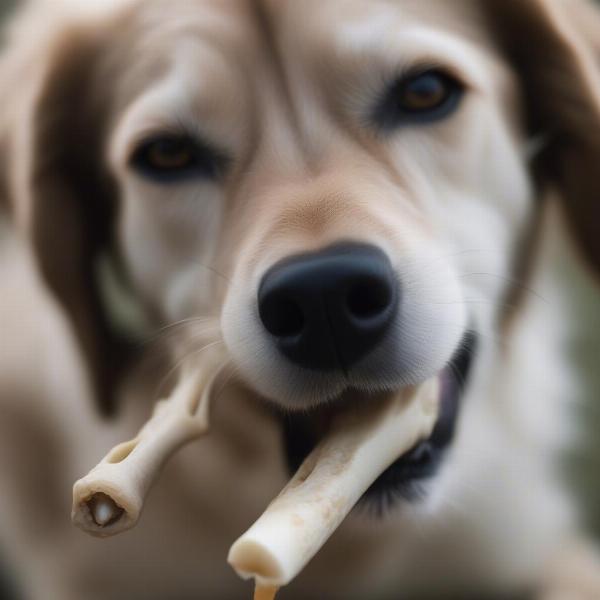Rabbit bones are a common find in many households, especially those with outdoor cats or hunters. But what if your canine companion snatches a discarded rabbit bone? Are rabbit bones safe for dogs? The short answer is no. While dogs may love gnawing on bones, rabbit bones, like chicken bones, pose significant risks and should never be given to your dog.
Rabbit bones are small, brittle, and easily splinter. These sharp fragments can cause a range of problems, from choking and mouth injuries to gastrointestinal issues. Even cooked rabbit bones, while slightly softer, can still splinter and pose a danger. Knowing the risks associated with rabbit bones is essential for responsible dog ownership.
The Dangers of Rabbit Bones for Dogs
While dogs have strong jaws and can crush some bones, rabbit bones are particularly dangerous due to their structure. They are thin and hollow, making them prone to splintering into sharp fragments. These splinters can cause various health issues:
- Mouth Injuries: Splinters can pierce your dog’s gums, tongue, or palate, leading to painful infections.
- Choking Hazard: Small pieces of bone can lodge in your dog’s throat, obstructing their airway.
- Digestive Tract Damage: Bone fragments can irritate or perforate the esophagus, stomach, or intestines. This can cause internal bleeding, blockages, and potentially life-threatening infections.
- Constipation: Bone fragments can compact in the intestines, making it difficult for your dog to pass stool.
 Dog Chewing Rabbit Bone
Dog Chewing Rabbit Bone
What to Do If Your Dog Eats a Rabbit Bone
If your dog has ingested a rabbit bone, monitor them closely for any signs of distress. These signs may include:
- Choking or gagging
- Vomiting
- Loss of appetite
- Lethargy
- Abdominal pain
- Bloody stool
- Straining to defecate
If you notice any of these symptoms, contact your veterinarian immediately. They may recommend inducing vomiting or performing X-rays to assess the situation. Early intervention is crucial to prevent serious complications.
Safe Alternatives to Rabbit Bones
Chewing is a natural instinct for dogs, and providing safe alternatives is crucial. Consider these options:
- Dental Chews: These are specifically designed to promote dental health and satisfy your dog’s chewing needs.
- Tough, Durable Toys: Look for toys made from robust materials that can withstand vigorous chewing.
- Frozen Treats: Freezing treats like carrots or peanut butter-filled Kongs can provide a long-lasting and satisfying chew.
Are Cooked Rabbit Bones Safe for Dogs?
While cooking might soften rabbit bones slightly, they can still splinter and pose a risk. It’s best to avoid giving your dog any type of rabbit bone, cooked or raw. The potential dangers outweigh any perceived benefits.
Can Puppies Eat Rabbit Bones?
Puppies, with their developing digestive systems and tendency to chew on anything, are particularly vulnerable to the dangers of rabbit bones. Never give a puppy a rabbit bone.
Conclusion
Rabbit bones are not safe for dogs. The risk of splintering and causing internal damage is too high. Always supervise your dog when they are outdoors, and ensure they do not have access to discarded rabbit carcasses or bones. Opt for safe alternatives to satisfy your dog’s chewing needs and protect their health.
FAQ
- What should I do if my dog swallows a small piece of rabbit bone? Monitor your dog closely and contact your veterinarian if you notice any signs of distress.
- Are there any types of bones that are safe for dogs? Large, raw beef bones (like femur bones) are generally considered safe, but always supervise your dog. Avoid cooked bones of any kind.
- What are the best chew toys for dogs? Durable rubber toys, dental chews, and frozen treats are all good options.
- Can I give my dog cooked rabbit meat? Cooked rabbit meat, without the bones, can be given to dogs in moderation as part of a balanced diet.
- What are the signs of intestinal blockage in dogs? Signs include vomiting, loss of appetite, lethargy, abdominal pain, and straining to defecate.
ILM Dog is your trusted partner for all things canine. We offer expert guidance on dog breeds, health, training, nutrition, and much more. From puppy care to senior dog support, we’re here to help you navigate every stage of your dog’s life. Contact us for personalized advice from our team of experienced dog professionals. Email: [email protected] Phone: +44 20-3965-8624. Connect with ILM Dog today for the best in canine care.